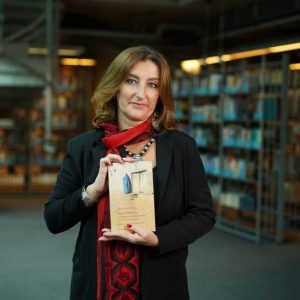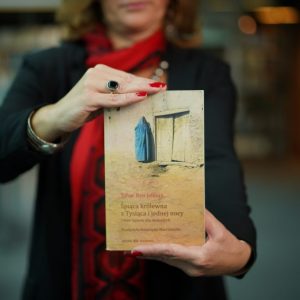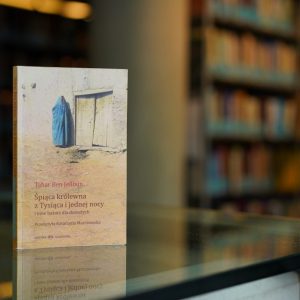“Tahar ben Jelloun’s tales combine the Eastern tradition of storytelling with the Western richness of Charles Perrault’s fairy tales. The hybridity of the collection corresponds to the hybridised identities of contemporary people in a globalised reality,” Dr Marta Widy-Behiesse, the Vice-Dean for Student Affairs at the Faculty of Oriental Studies, says in the next episode of the “Read with the UW” about The Sleeping Beauty from One Thousand and One Nights.
Dr Marta Widy-Behiesse is an Arabist specialising in the field of Islam. She works at the Faculty of Oriental Studies, University of Warsaw. She completed her studies at the Institute of Oriental Studies of the University of Warsaw and obtained her doctoral degree in 2009. She teaches classes on Muslim men and women in Western Europe, Maghreb countries, popular culture and equality issues. She is a co-founder of the Department for European Islam Studies and the newly established Laboratory of Research on the Culture and Art of Asia and Africa at the Faculty of Oriental Studies, University of Warsaw.
The researcher is the author of the books: Feministki muzułmańskie na Zachodzie, Tożsamość europejskich muzułmanów w myśli Tariqa Ramadana and Życie codzienne w muzułmańskim Paryżu.
Since 2017, Dr Marta Widy-Behiesse has held the position of the Vice-Dean for Student Affairs at the Faculty of Oriental Studies at the UW.
Moroccan roots
“The Sleeping Beauty from One Thousand and One Nights and Other Fairy Tales for Adults is a new interpretation of Charles Perrault’s fairy tales. The author adapts well-known stories such as Cinderella, Puss in Boots or Little Red Riding Hood and brings them into the reality of the Maghreb world, the Arab world, and the Islamic world,” Dr Marta Widy-Behiesse says.
The author of the collection of ten fairy tales is Tahar ben Jelloun, who was born in the Moroccan city of Fez. He studied philosophy, sociology and psychiatry. In 1971, he emigrated to France, and two years later he published his first novel, Harrouda. In 1987, he was awarded the Goncourt Prize for his book Holy Night, which was also published in Poland. Other Polish translations of his works include Dziecko z piasku (Sand Child) and the essay Co to jest islam? Książka dla dzieci i dorosłych. (Islam Explained).
“Tahar ben Jelloun is an outstanding author. He brings together worlds seemingly torn apart. He comes from Morocco and lives in France; he is a Muslim who brings a ‘human’ image of Islam to the West,” Dr Marta Widy-Behiesse says.
The video is available on the university’s YouTube channel.
An oriental element
“Tahar ben Jelloun is a poet, a writer, and a scholar, in whose texts we can find all the ‘layers’ of his education. His literature is also a kind of study of migration and the relationship of the Muslim and Arab world with the West and Europe,” Dr Widy-Behiesse explains.
In the original, the collection is called Mes Contes de Parrault, which literally means My Tales of Perrault. The writer retains the original structure of the works, but departs from the familiar text. The work – largely restorative – has not only been enriched with an oriental element. The author also moves the action to the modern times.
“I think that the elements by which the message has been enriched will surprise the readers,” Dr. Widy-Behiesse says, “We have Little Red Riding Hood in a burqa, Lalla Aisha from the Muslim world instead of a fairy, who fights for women’s rights, and the prince – Cinderella’s fiancé – delivering a feminist manifesto during the nuptials.”
Sleeping Beauty from One Thousand and One Nights by Tahar Ben Jelloun is available at the University of Warsaw Library in free access, the Romance literature section, P-Q.







